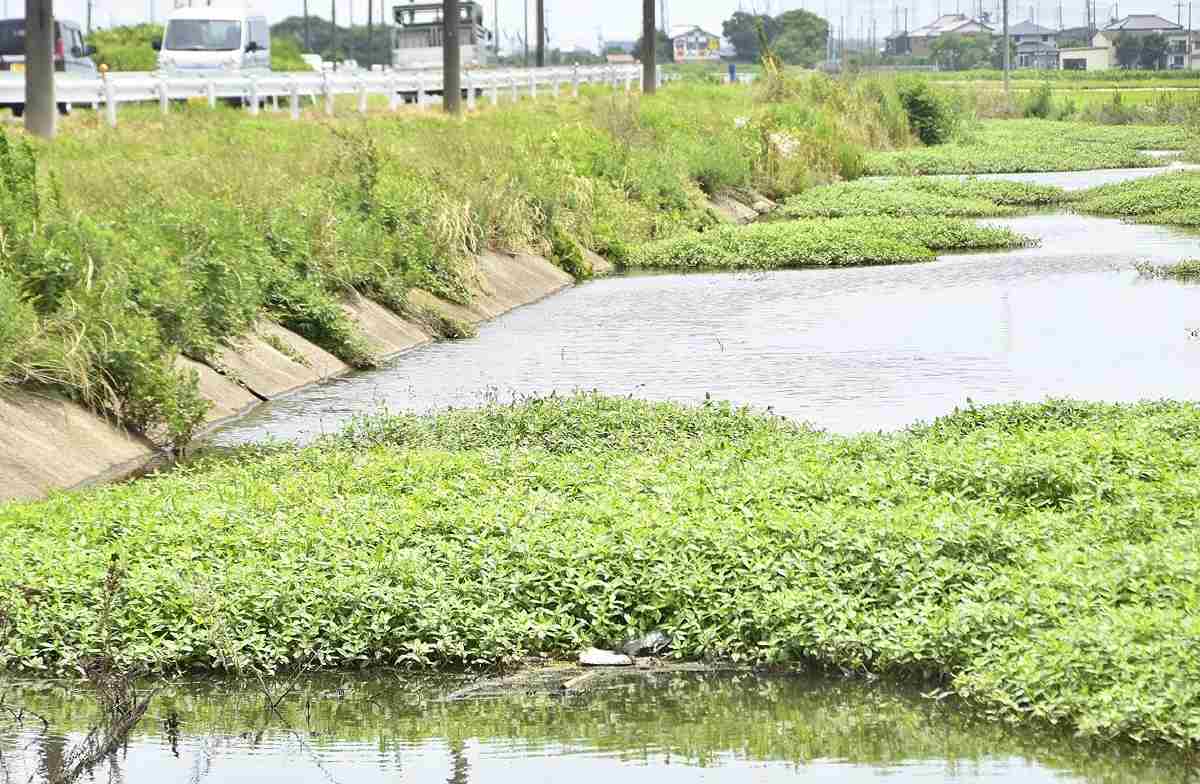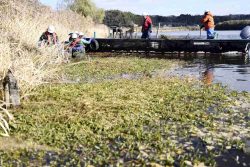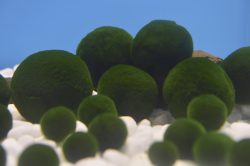
Alligator weeds cover the river surface in Asahi, Chiba Prefecture, in early July.
1:00 JST, August 1, 2023
Alligator weed, an invasive plant native to South America, is spreading in Chiba Prefecture and other parts of Japan, clogging waterways and wreaking havoc in rice paddies.
Farmers have expressed concern about the spread of the aquatic plant, which has been described as one of the fiercest and most damaging invasive species.
“An unfamiliar weed started growing several years ago,” said a rice farmer in Chiba Prefecture. “No matter how much I remove them, they never stop growing. It’s an endless battle.”
The Chiba prefectural government has asked the central government to find and fund measures to eliminate the weed, which can be spotted along the rivers in the prefecture, including Akita River, a waterway that runs through a rice paddy area in Asahi.
The stem of the plant measures about 50-100 centimeters in length and about 4 millimeters in diameter, and its leaves can cover the surface of a river from bank to bank.
If a broken stem ended up in a paddy it would grow and spread, threatening rice production, according to the 69-year-old rice farmer who has paddies near Akita river.
Alligator weed is designated as an invasive alien species by law and outdoor cultivation of the plant is prohibited.
The weed was originally brought to Japan as an ornamental water plant, according to the database of the National Institute for Environmental Studies.
It first became prevalent in Hyogo Prefecture in 1989, before expanding to other parts of Japan.
As of 2022, it had been detected in 25 prefectures including Tokyo, and was detected in Yamanashi Prefecture for the first time last autumn.
“Alligator weed is amphibious and resistant to heat and dryness,” said Katsuki Nakai of the Shiga Prefectural Lake Biwa Museum. “Their stems break easily and new plants can grow from broken stem fragments.”
Even if the weeds are cut, if they are left on the ground, or if a part of the stem remains in the soil, new plants will grow, according to Nakai.
“Eliminating them by hand does not help much. Cooperation with an administrative body is essential,” said a member of a citizens’ group working to remove alligator weeds from Teganuma Lake in Chiba Prefecture.
The Chiba prefectural government offers subsidies to remove the weeds, but it would cost more than ¥20 million to eliminate the plant just around the Akita River, according to estimates, and the prefecture lacks the funds for such operations across the prefecture.
“It is necessary to secure budget from the central government and establish an effective method to eliminate the weeds as quickly as possible,” Chiba Prefecture Gov. Toshihito Kumagai said at a meeting with other governors in May.
Top Articles in Science & Nature
-

Japan Institute to Use Domestic Commercial Optical Lattice Clock to Set Japan Standard Time
-

Japan to Face Shortfall of 3.39 Million Workers in AI, Robotics in 2040; Clerical Workers Seen to Be in Surplus
-

Record 700 Startups to Gather at SusHi Tech Tokyo in April; Event Will Center on Themes Like Artificial Intelligence and Robotics
-

iPS Treatments Pass Key Milestone, but Broader Applications Far from Guaranteed
-

iPS Cell Products for Parkinson’s, Heart Disease OK’d for Commercialization by Japan Health Ministry Panel
JN ACCESS RANKING
-

Japan PM Takaichi’s Cabinet Resigns en Masse
-

Japan Institute to Use Domestic Commercial Optical Lattice Clock to Set Japan Standard Time
-

Israeli Ambassador to Japan Speaks about Japan’s Role in the Reconstruction of Gaza
-

Man Infected with Measles Reportedly Dined at Restaurant in Tokyo Station
-

Videos Plagiarized, Reposted with False Subtitles Claiming ‘Ryukyu Belongs to China’; Anti-China False Information Also Posted in Japan
























